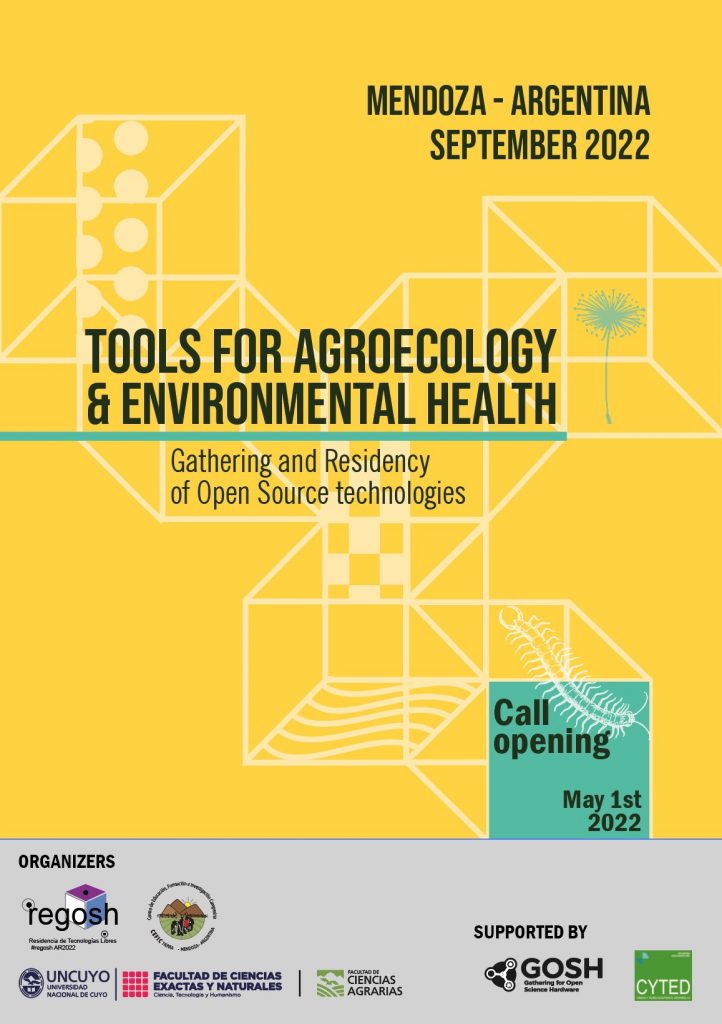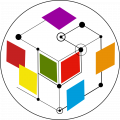open science hardware residence + gathering
Tools for agroecology and environmental health
Mendoza, Argentina – September 2022
GUESTS:
Julieta Arancio
University of Bath, CENIT-UNSAM
Greg Austic
Our-Sci/Bionutrient Institute – EEUU
Fernan Federici
Laboratorio de tecnologías libres – Pontificia Universidad Católica de Chile
ORGANIZERS:
reGOSH – Red de tecnologías libres para ciencia y educación de América Latina
CEFIC – Centro de Educación, Formación e Investigación Campesina
UN Cuyo – Universidad Nacional de Cuyo
SUPPORTED BY:
CYTED (http://cyted.org)
Gathering for Open Science Hardware (http://openhardware.science)
Fundación Alfred P. Sloan (https://sloan.org).
SAVE THE DATE:
Residence: 5-19 September 2022
Gathering: 20-23 September 2022
The call for participation and projects, both for the Residence and the Gathering, opens on May 1st 2022

why open technologies for science?
In recent years, open source technologies and in particular open scientific hardware have gained visibility among researchers and laboratories around the world. From the manufacture of respirators during the pandemic to the construction of equipment to analyze the nutritional density of food, open source technologies demonstrate their potential to respond to complex problems opening science endeavors to new actors and social groups.
In Latin America, open source technologies have a significant potential. Faced with historical deficiencies of technology in universities and reduced budgets for science, these technologies constitute a concrete opportunity to gain access to infrastructure for the production of knowledge and addressing relevant problems. Having accessible and modifiable tools opens a way to investigate local questions, which do not find place in the dominant scientific agenda.
about the event(s)
The Residence, from September 5 to 19, gathers participants to improve, prepare and integrate existing free and open source hardware projects to the needs of user communities in Mendoza. Today, these communities seek to use the tools to answer questions and problems related to the agroecological transition and environmental health. Prior to the residence, a call will be opened for those who want to participate: hardware experts, software developers, communicators, scientists, researchers, data experts.
Once the residence is over, the Gathering, to be held between September 20 and 23, seeks to outline a common agenda and strategies that allow the consolidation and advancement of this network in Latin America. Prior to the gathering, a call will be opened for those who want to be part of the conversation and workshops: users, developers, researchers, activists and policy makers who work or have an interest in free and open source hardware.
Projects and thematic lines proposed for the Residence
Local projects
These projects are part of the Open Agroecology Laboratory in which the reGOSH Mendoza node has been working for the last two years. These are existing prototypes that require specific contributions to achieve a degree of stability that allows their daily use in rural laboratories.
Soil respiration chamber:
- chamber development and comparison with our-sci chamber
- integrate to our-sci reflectometer interface
pHmeter
- Android interface development for to use for tomato preserves
- Possible integration to Our-Sci app
Colorimeter
- Close documentation and improve case design
Microscopes
- Use of open source microscopes for soil microbiology and food quality
Collaboration with Our-Sci (USA)
During the residency, Greg Austic from Our-Sci will visit us and share his experience in setting up the Bionutrient Lab, a laboratory for the analysis of bionutrients in soil and food. We will work together on the assembly of a portable reflectometer and a soil respiration chamber laboratory. Along with local producers, we will analyze local samples to build a small database and we will use analysis and visualization tools to share and compare different agricultural practices.
Some of the specific activities to be developed will be:
- Assembly of reflectometer and breathing chamber for laboratory.
- During the residence, local samples will be analyzed for the following parameters:
- On soil:
- Respiration (CO2 flow)
- Scanning with a reflectometer. Soil carbon prediction. Protocol to obtain activated carbon (POXC)
- pH
- In food:
- Scanning with reflectometer to predict nutrients
- Brix
- On soil:
- Integration of local prototypes to the Our-Sci App
- Run a small sampling of local farms to provide diverse soil and plant tissues for local collaborators with different hardware they may want to test or calibrate.
Themes of interest
- Agroecology. Open source technologies applied to the agroecological transition.
- Environmental health. Community epidemiology.
- Environmental DNA monitoring
- Water monitoring. Development of tools for community monitoring and experiences of public data use.
- Agrometeorological monitoring. Low cost weather stations. Remote sensing in crops.
- Mapping and use of environmental data. Georeferenced databases. Visualization.
Although the focus of the residence is on these topics, the Gathering will be open to all topics related to free technologies and open scientific hardware, including artificial inteligence, health, education, etc.
